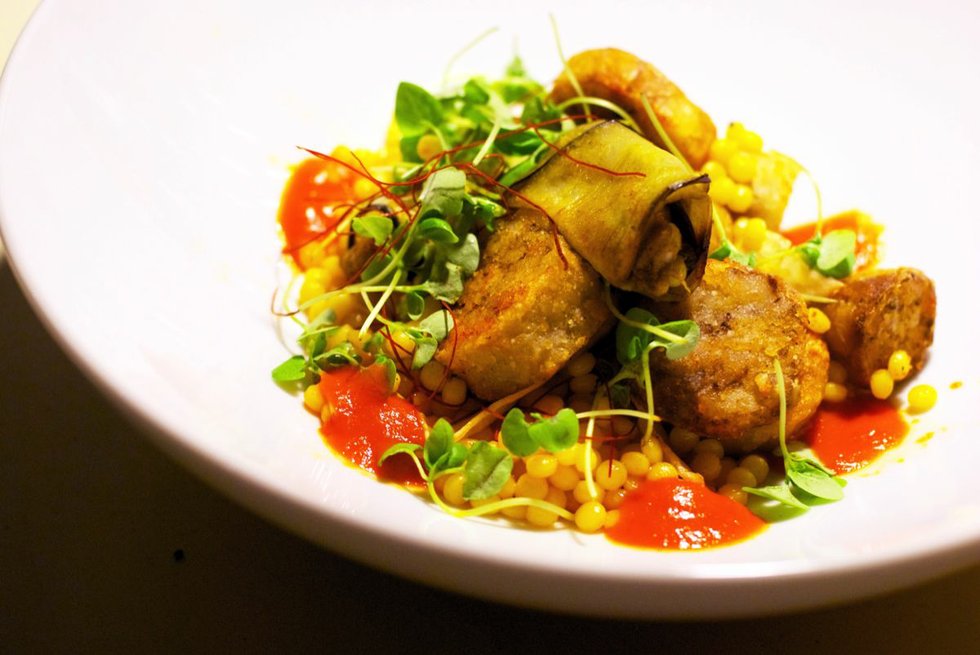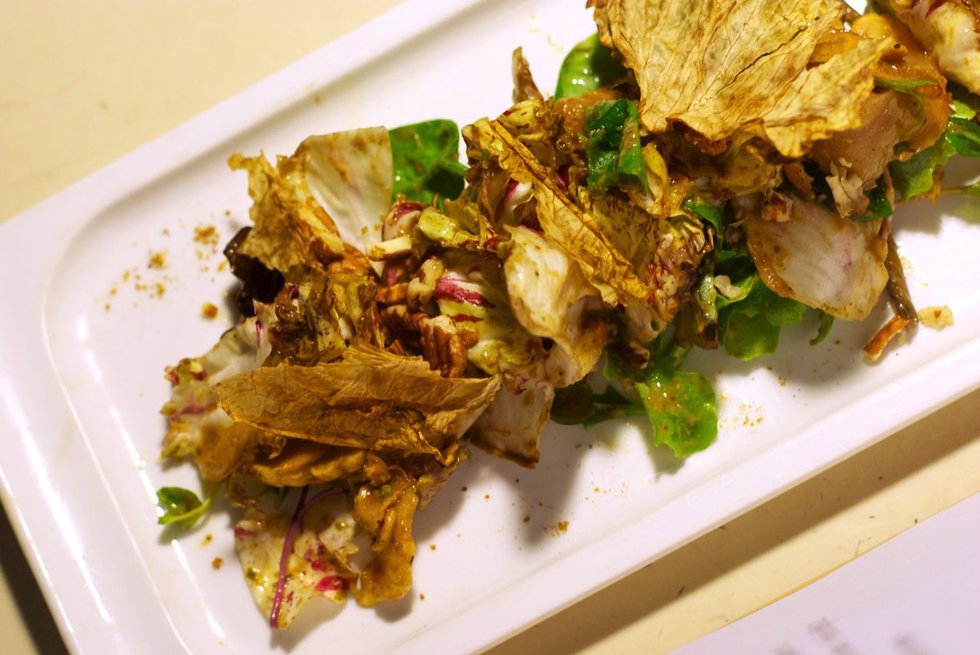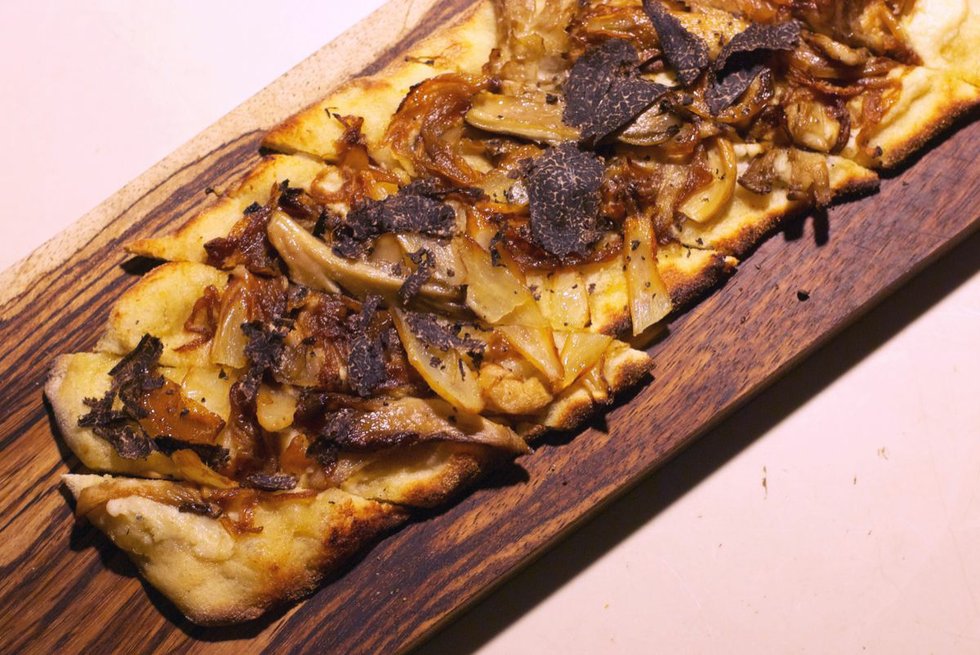
For some restaurateurs, opening a vegan place might seem a risky move. Good thing Nathan Isberg has already pulled every other risky move in the book.
At his previous restaurant, the Atlantic, the iconoclastic chef experimented with pretty much every accepted cornerstone of the service industry. At various times, he did away with menus, stopped serving alcohol, made do without service staff and encouraged customers to pay him whatever they felt the meal was worth. (He also accepted trades for art or therapeutic massages.)
Finally, in 2015, he swore off the restaurant industry altogether, shuttering the Dundas West kitchen to head for the Arctic and Peru. “My discussion about restaurants has been against restaurants, so it doesn’t make sense to continue that discussion,” Isberg told Toronto Life at the time.
It might be surprising, then, that Isberg has resurfaced at Awai, a stately and serene spot with an all-plant menu in Bloor West Village (2277 Bloor West, at Durie, 647-643-3132, awai.ca).

The serene dining room at Awai.
Like Yorkville’s Planta, the other new green machine in Toronto’s dining scene, Awai offers refined vegan spins on favourite dishes, but it more closely hews to comforting, homespun recipes than splashy international bar eats: think buttery sunchoke ravioli or earthy puréed porcini mushroom soup.
Plenty of that Isberg idiosyncrasy remains. Wines are back, but the list contains notes like: “Grange of PEC Chardonnay – A dry crisp shirt, linen slacks, say something nice for a change.”
Servers and cooks both run dishes out to tables. On the mains list, a $3 (that’s not a typo) curry of the day sits happily beside a $25 mushroom paella. A “subjective whimsy on a flatbread” from the wood-burning oven is pay-what-you-want, as is the chef’s tasting menu (which has a suggested – though unlisted – price of $80 and is absolutely worth every penny).
Isberg lays out his philosophy on militant veganism, why tipping is “absurd” and how cooking is like a Lars von Trier movie.

Natalia Manzocco
Artichoke ravioli with pea tips and migas.
You said you would quit running restaurants after the Atlantic closed. What prompted the change of heart?
I’ve been in the industry since I was 17. A couple of times, I’ve said, “I’m never going back to restaurants. They’re ridiculous.” Even years ago, with Dave Haman – he’s now running Woodlot – we were walking down the street saying, “Restaurants fucking suck, we’re never doing this again,” and then a couple weeks later we opened Czehoski.
Restaurants get boring or stale after a bit, but after a year away, I started to miss it. It’s something I’ve done for a couple of decades. I learn through doing – I like having a context where I can apply new ideas and learn from them.
Tell me how you settled on this space.
I actually had no idea I was opening a restaurant. When I came back into town briefly, Roger [Yang], my partner in the venture, said, “Want to look at some spaces, see if anything interests you?” I thought, “Why not? Nice way to spend the afternoon.” We asked about this one, but it wasn’t up for lease. I went down to Peru, and Roger saw it had become available and took it right away. I came back and was like, “Oh, guess I’m opening up again!” I underestimated how on point Roger was.
There’s more space, a different feel here. I could really step up what I was doing. There was a capacity to try out some stuff here that I wouldn’t have tried otherwise.

Fresh sprouts are grown in-house.
All-vegan menu aside, has your style of cooking changed?
There are a lot of ingredients that carry over, a lot of spices. But it’s a completely different kitchen. I do a lot of stuff in the wood oven. Most dishes are at least begun in there, if not finished, and that helps create a different style of food, a different register of flavour.
What were you up to between Atlantic and Awai? I read that you were working with the Timiskaming First Nation to help them promote the produce they forage.
That’s actually one of the biggest reasons I’m doing this restaurant – to keep up that partnership with them. There are a lot of really amazing flavours there that aren’t common down here. Right now I’m using the spices and herbs we got last autumn: sweet fern, elderberries, some wild juniper, cedar tips. The mushrooms are great, because there are so many. I’ve never seen anything like it. There are places with fields of chanterelles and more porcini than I could ever really use. That was a real revelation.

Isberg’s crispy eggplant dish features eggplant involtini and Israeli couscous.
You’ve experimented with breaking nearly every rule central to the service industry – tipping, booze sales, employing servers, menus, prices. When it came time to open Awai, how did you decide which of those tenets to stick with and which to discard?
I was anxious about the potential of “selling out” on some of those concepts with Awai, but what I’ve been able to do instead is expand on them. I can still have less of a division between serving and cooking, and it still works. I can still do pay-what-you-want, and it still works.
One of the problems with pwyc was that it made people feel a little anxious at times. The biggest hurdle wasn’t whether you made the money or not – it was more that people paid too much or felt a little awkward about the whole thing. I wanted to provide opportunities to offer both pwyc and priced options, and be a little more flexible.
At a certain point, to totally dismiss the institution of restaurants out of hand seems a little reactionary instead of being proactive and looking at what potential there is for change and trying to add to the culture in a positive way. Leaving the industry and criticizing it from the outside would not be very helpful, or very interesting. You don’t really shift anything.
As much as I sort of had to eat some of my words on doing certain things, it’s a worthwhile thing to have done. Reneging on my criticisms is probably not a bad thing.

Natalia Manzocco
Apple salad with radicchio and pecans.
More and more restaurants are abolishing tipping in favour of paying their employees standard wages, something you do at Awai. How do you feel about this sea change?
It seems absurd that tipping exists as an institutional norm. It’s deeply problematic in terms of who’s responsible for taking care of employees and what the relationship is between employees and employers. It also doesn’t make sense to create a business model that depends on the capricious nature of the public to support the people who work for you.
Beyond that, you start to realize how much sense getting rid of tipping makes from a business perspective. I can have staff who are more engaged with what they’re doing, as opposed to just looking for tips, which can sometimes create a lot of conflict and difficulty. It also simplifies things in terms of who on the team does what. We’ve got a great crew here, and they get it.
Is doing away with animal products and cooking a vegan menu a boon or a limitation for a chef?
I think a boon – for me, anyway. When I started out at the Atlantic, I’d watched [Lars von Trier’s movie] The Five Obstructions. A filmmaker is trying to recreate his seminal masterpiece but without replicating the creative process he used the first time. He ends up creating these phenomenal variations. You find the essential in what you’re doing, as opposed to the tropes, the tricks. It drives a lot more creative engagement.

Natalia Manzocco
Truffle and mushroom flatbread.
I know you’ve been eating a plant-based diet on and off for some time. What’s your relationship with veganism?
To be honest, it’s a little conflicted. As a concept, it tends to make people a little myopic about their relationship to food. Veganism is a good jumping-off point, but I would be wary of buying into it as the redemptive way of living. The discussion is more about considering a relationship to animals beyond “We shouldn’t eat them, they’re so cute.” All these posters I see play on the idea of its being inherently good to protect animals, and that’s the only environmental initiative.
In the North, for example, forgoing meat is not an option. In Pond Inlet, if you’re not hunting seals or narwhal or bear or fishing, you’re not eating. It’s not an ambiguous discussion.
But here we don’t need to eat animals. I’m sort of bored with meat actually – basically since after Czehoski – thoroughly bored by people’s fascination with it, eating it, cooking with it. I find it really banal.
Tell me about that $3 curry dish.
The premise behind that is to break down divisions between people and restaurants that serve really bourgeois fare so only certain people can eat there. The idea actually comes out of a program in Belo Horizonte, Brazil, where anyone can go to a restaurant and get a well-done meal that’s affordable (often as cheap as 50 cents). It breaks down divisions between the two sides.
The way I look at it, I can make money off wine and stuff (to make up for that dish). But I already have a bit of an issue with commodifying food. I think the more that becomes normalized, the further we get from making sure people’s essential needs are met.
nataliam@nowtoronto.com | @nataliamanzocco












